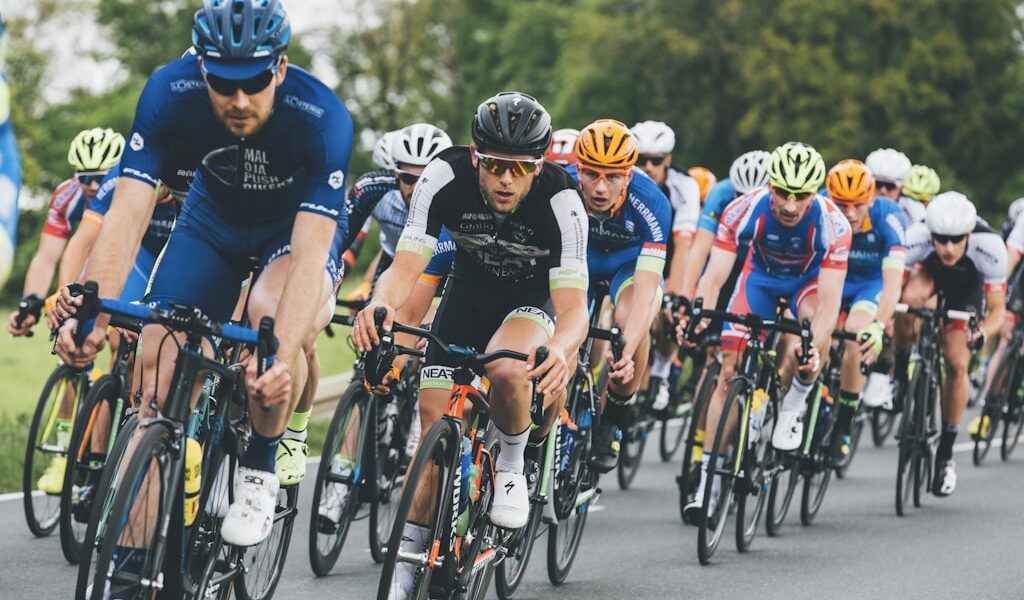Participating in Cycling Competitions
Participating in cycling competitions has gotten complicated with all the category upgrade rules, power-based training zones, and equipment regulations flying around. As someone who’s competed in 120+ races over nine years — from local crits to regional stage races — I learned everything there is to know about succeeding in competitive cycling. Today, I will share it all with you.
I track every race in a detailed spreadsheet. Average watts, placement, what went wrong, what worked. My training partners call it excessive. They’re absolutely correct. But that data-driven approach helped me upgrade from Cat 5 to Cat 2 in four years. Here’s what actually matters for competitive cycling success.

Choosing the Right Type of Cycling Event
There are several types of cycling competitions, each with its own unique demands. Road races, criterium races, time trials, cyclo-cross, and mountain bike races are just a few. Road races are endurance-focused. Criterium races are high-speed and laps-centric. Time trials emphasize solo efforts against the clock. Cyclo-cross combines road cycling and off-road elements. Mountain bike races are rugged and technical. Each type demands different skills, so choose the one that aligns with your strengths and interests.
Training and Preparation
Training is critical. Structured training plans can improve your stamina, strength, and speed. Include long distance rides, interval training, and recovery sessions in your schedule. Consistency is key; train regularly and progressively increase your workload. Cross-training, including activities like running and swimming, can boost overall fitness and enhance cycling performance. Don’t neglect rest days as they prevent burnout and promote muscle recovery.
Nutrition and Hydration
Proper nutrition fuels your training and competition. A balanced diet rich in carbohydrates, proteins, and fats is essential. Carbs provide quick energy. Proteins assist in muscle repair. Fats offer sustained energy. Hydration maintains performance levels. Drink water consistently throughout the day, not just during exercise. For longer races, consider electrolyte drinks to replace lost minerals.
Gear and Equipment
The right gear can make a difference. A well-fitted bike maximizes efficiency and comfort. Helmets are non-negotiable for safety. Cycling shoes enhance power transfer. Padded shorts reduce discomfort during long rides. Invest in quality tires and keep your bike well-maintained to avoid mechanical failures. For races, lightweight and aerodynamic equipment can offer a competitive edge.
Race Day Strategies
Probably should have led with this section, honestly. Arrive early to get acquainted with the course. Warm up properly to prepare your muscles and get into the right mindset. Know your strengths and plan your strategy. In road races, drafting behind other cyclists can save energy. In time trials, pace yourself to avoid early exhaustion. During criterium races, position yourself well to avoid congestion. Cyclo-cross and mountain bike races require adaptability due to varied terrain.
Mental Preparation
Mental toughness is as important as physical strength. Visualize success and stay positive. Set realistic goals and focus on your progress rather than the competition. Stay calm under pressure and adapt to unforeseen challenges. Confidence grows with experience, so participate in smaller races to build your mental resilience.
Post-Race Recovery
That’s what makes competitive cycling endearing to us racers — the suffering creates clarity about what really matters in training and preparation. Recovery is crucial for long-term performance. Cool down with light exercise to gradually lower your heart rate. Stretch to prevent stiffness and injury. Refuel with a balanced meal to replenish energy stores. Hydrate well to aid recovery. Give your body time to rest before resuming intense training.
Connecting with the Cycling Community
Cycling competitions foster community engagement. Participate in group rides to learn from more experienced cyclists. Join local clubs or online forums to exchange tips and experiences. Volunteering at events can offer insights and strengthen community bonds. Networking enhances your knowledge and enjoyment of the sport.
Understanding Race Regulations
Familiarize yourself with the rules of the competition. Know the course details, start times, and checkpoints. Follow the race officials’ instructions and adhere to safety protocols. Respect fellow competitors and practice good sportsmanship. Familiarity with regulations ensures a smooth and fair racing experience.
Monitoring Your Progress
Keep track of your performance. Use cycling apps or devices to monitor speed, distance, and heart rate. Analyzing data helps identify strengths and areas for improvement. Adjust your training accordingly to optimize results. Celebrate small victories to stay motivated and gauge your progress.
Balancing Life and Training
Balancing cycling with personal and professional life can be challenging. Create a realistic training schedule that fits your commitments. Communicate your goals with family and friends for support. Prioritize quality over quantity in your training sessions. Ensure you have time for relaxation and social activities to maintain overall well-being.
Financial Considerations
Participating in cycling competitions can be costly. Budget for entry fees, travel expenses, and gear. Look for sponsorships or team memberships to offset costs. Consider second-hand equipment in good condition to save money. Proper planning prevents financial stress and allows you to focus on training.
Embracing Continuous Learning
Cycling is a dynamic sport. Stay informed about the latest trends, techniques, and technologies. Attend workshops, read articles, and watch instructional videos. Learning from others keeps you updated and competitive. Embrace feedback from fellow cyclists and coaches to refine your approach.
Participating in cycling competitions is a rewarding experience that tests your limits and bonds you with a passionate community. With the right preparation, mindset, and support, you can achieve your cycling goals and enjoy the journey.
Recommended Cycling Gear
Garmin Edge 1040 GPS Bike Computer – $549.00
Premium GPS with advanced navigation.
Park Tool Bicycle Repair Stand – $259.95
Professional-grade home mechanic stand.
As an Amazon Associate, we earn from qualifying purchases.


